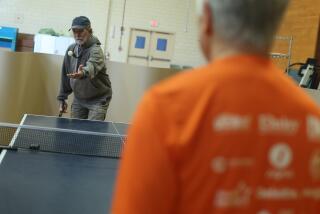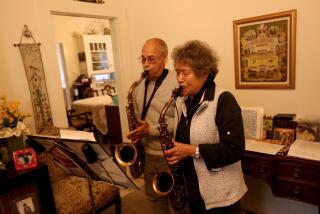Rewriting the Epilogues to Life
- Share via
Until about three years ago, my 98-year-old grandmother read most of the Sunday paper. It took her the whole week, but she was as diligent as she was about her daily walk. There was no one with whom to discuss the news of the day, and only a stranger to accompany her on those walks, but no matter. She had always believed that discipline was the foundation of a good life.
Once she moved into the nursing home, though, her resolve began to weaken. She was cut off from the mundane responsibilities that had given her life a shape, if not a meaning: Someone else did the cooking, the cleaning, the bed-making. Or rather, a series of someone elses--anonymous, belligerently cheery employees who used the same kindergarten teacher tone with each elderly resident they encountered. Some might have been genuine, but none of them were specific to my grandmother.
Nothing was. She complained bitterly about the food; not the quality of it, which was pretty good, but the imperative of it. A stranger decided what and where Ethel ate every day. Robbed of the demarcations of daily life, she began to drift. The Sunday paper was a casualty of the new order. She couldn’t always get a copy, and after a while, it seemed more an obstacle than a ritual.
So she did not see the headline in the newsstand right outside the entrance to the home, the one about the Supreme Court decision on assisted suicide.
Not that it mattered. In the absolutely lucid early days of her 10th decade, she sometimes speculated about why God had not yet taken her. There was no self-pity; just bewildered curiosity. She had a daughter, two granddaughters and three great-grandchildren, one a newborn. She decided he must have left her on earth to meet my daughter, and once she did, she would die.
I postponed the visit to Chicago until Sarah was 4, terrified that I would return home from the airport to learn that Ethel’s prophecy had come true. When they finally met, and she still did not die, she wondered again what the divine agenda was. But she never questioned its appropriateness.
The assisted suicide movement bears an odd resemblance to the heroic, life-sustaining medical efforts it challenges: Both sides of the argument are big drama, bold issues. We are a nation of control freaks, convinced that we can win every hand that genetics has dealt us, from the color of our hair to the diseases that lay encoded in our DNA. If we can’t conquer mortality quite yet, surely we can customize it.
All this has nothing to do with my grandmother or with the thousands of other senior citizens who woke up this morning in a bed not their own to the smiling face of an aide who gave notice yesterday. Dismiss Ethel, if you need to, as someone who is so old as to have defied demographics. There are plenty like her, 10 years, 20 years younger, facing the same blank lives. They need more than maintenance.
The large issue is not assisted suicide but assisted living. It is not how to guarantee a good death, but how to promote a good life. What to do with Ethel and her friends, the ones congregating by the nurses’ station for the daily elevator ride downstairs to lunch? What to do, indeed, since they will be followed by my mother’s generation and then by the huge population blip that is me and my middle-aged pals.
There are so many possibilities, none of them requiring added effort from nursing home staffs or, in this case, from a weary 73-year-old only daughter. Many elementary schools have initiated projects to teach their young students social responsibility: food drives for the homeless, toy collections at holiday time. What if their older siblings did an oral history project at a local nursing home? Or came in for an hour twice a week to read to residents? Or sing with them?
The list is as long as imagination. But it requires that we look at our elderly, something this society prefers not to do. Medical technology has been very successful at helping us extend physical life, and proponents of assisted suicide are now trying to ensure that we can navigate our own exit. Both are meaningless unless we learn to tend the emotional terrain in between.


